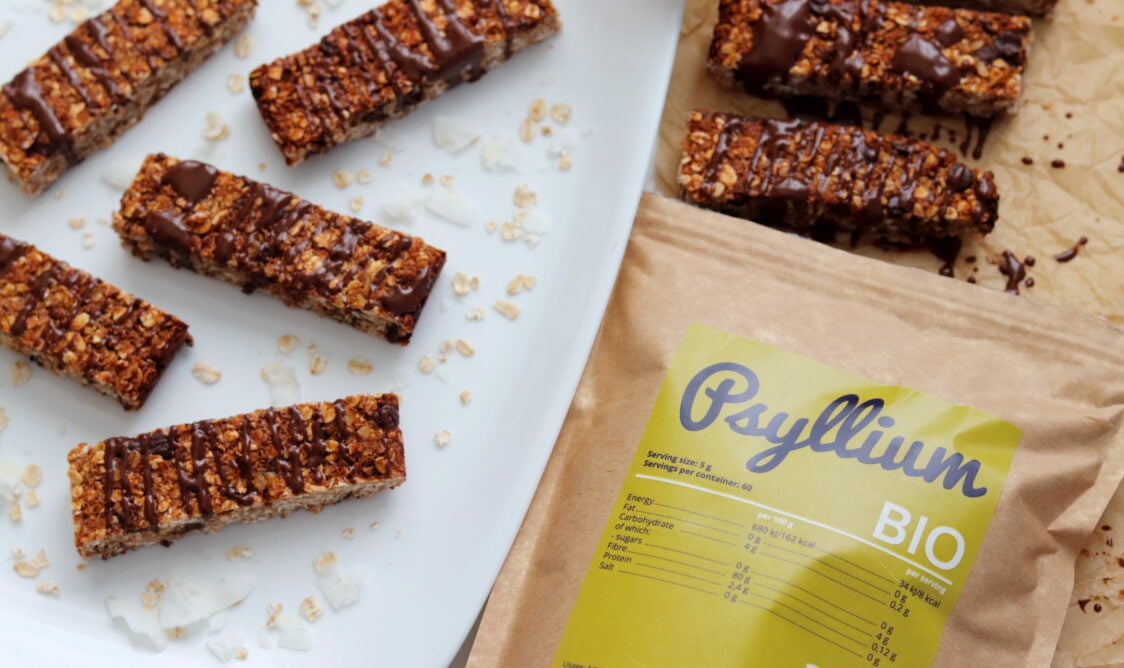Table of Contents
Have you ever been told that to improve your digestion or enrich your diet with fibre, you should take psyllium? In fact, this is not bad advice at all because this plant-based dietary supplement can truly comfort your discontented stomach while bringing along additional benefits. So, what is psyllium, and how can it benefit you?
In this article, you’ll learn about the impact of psyllium on the following areas:
What is Fibre?
As we’ve already hinted, psyllium is a type of fibre. In essence, fibre is a type of carbohydrate that the body lacks the enzymes to digest, so it leaves the body in almost the same form it was ingested. Despite this, it has many benefits and is an essential part of a healthy diet. A typical healthy adult should consume 25-30 g of fibre per day. [5,10]
Fibre is found exclusively in plant-based foods. Its good sources include legumes, whole grains, vegetables, fruits, nuts and seeds. [4]
How is Fibre Divided?
There are two types of fibre in foods and nutritional supplements: soluble and insoluble. Each one functions a bit differently, but both are essential for our health. Fortunately, in food sources, they are usually combined, so you only need to monitor whether you are consuming a generally sufficient amount of fibre-rich foods.
- Insoluble fibre acts like a “broom” in the intestines. It absorbs water, increases its volume and accelerates the passage of digested contents through the digestive tract. This type of fibre is excreted from the body without any changes. Examples include cellulose or hemicellulose.
- Soluble fibre absorbs water in the small intestine, forming a gel-like substance. This slows down digestion, helping you feel fuller. In the large intestine, it serves as food for beneficial gut bacteria and affects the optimal composition of the gut microbiome. Examples include inulin, pectin, and glucomannan. [4]
Learn more about fibre, its types, effects on health, and food sources in the article Fibre: Why Do We Need It, and Where Can We Find It?

What is Psyllium?
Psyllium is a fibre derived from the Plantago ovata plant, commonly known as Arnoglossum. Its benefits have been recognized in traditional Chinese and Ayurvedic medicine, where it was used for issues such as high blood pressure and some skin problems.
Among other types of fibre, psyllium is quite unique because, even though it falls under soluble fibre, it exhibits characteristics of insoluble fibre as well. It contains three different components, each behaving slightly differently.
What Types of Fibre are Found in Psyllium?
- 15-20% consists of insoluble fibre
- 55-60% represents the component that can create a gel in the digestive tract
- 10-15% is composed of viscous fibre which does not create a gel
Thanks to this combination, psyllium is a versatile fibre with a broader spectrum of benefits compared to other types.
Lastly, it’s worth mentioning that psyllium is a gluten-free food, so it is safe for individuals with celiac disease or those with wheat allergies or non-celiac gluten sensitivity. [8,9]
How Does Psyllium Work?
In the small intestine, psyllium absorbs water and forms a gel, which is typical for soluble fibre. One might assume that this would slow down digestion, but on the contrary, it accelerates it, much like insoluble fibre. Additionally, it significantly increases the volume of stool, which is a common trait of insoluble fibre. Consequently, it is typically used as a laxative, a substance that can promote and expedite bowel movements, which is beneficial in cases of constipation.
Interestingly, psyllium is less metabolized by gut bacteria in the small intestine compared to what is typical for soluble fibre. This allows it to retain its ability to hold onto water, maintaining its large volume, which aids in the smooth passage of stool. Moreover, because bacteria have minimal impact on psyllium, it remains almost untouched, making it effective for its intended purpose.
What Are the Health Benefits of Psyllium?
1. Positive Impact on Digestion
Like all types of fibre, psyllium’s primary and most potent benefit lies in its positive effect on our digestive system. It is a versatile dietary supplement with a wide range of uses, and doctors often recommend it as a helpful aid for digestive issues.
- Psyllium is a well-known bulk-forming laxative. In practice, this means that it absorbs water and increases the volume of stool, making it easier for stool to move through the digestive tract. This helps with better bowel movements.
- It also softens the stool and improves its consistency. However, it’s essential to remember that this can only work effectively when you also maintain adequate hydration.
- Overall, it can simply support and expedite bowel movements.
- It can thus help with constipation and can also be used to prevent it.
- On the other hand, it is also suitable for issues with diarrhoea, because it can absorb excess water, thus thickening the stool.
- It can normalize bowel movements and provide assistance for both of these contrasting difficulties. [14]
Psyllium and Irritable Bowel Syndrome (IBS)
Studies suggest that psyllium may be effective for people suffering from Irritable Bowel Syndrome (IBS). IBS is a troublesome condition characterized by irregular bowel movements, flatulence, cramps, and alternating episodes of diarrhea and constipation, with varying combinations of these symptoms. The causes of this problem are typically quite complex. However, psyllium seems to be one of the aids that could help alleviate symptoms. There is no recommended dosage for psyllium for IBS, but studies mention effective doses of around 20 grams daily. [7,11]
Does Psyllium Cause Bloating?
One significant advantage of psyllium is that, unlike other types of soluble fibre (e.g., inulin found in chicory syrup or glucomannan), it is not typically associated with bloating even in excessive amounts. Gas is usually formed when fibre is metabolized by intestinal microorganisms. However, only a very small portion of psyllium is processed in this way, so it usually does not cause bloating. If you are looking for a supplement to assist with bowel movements but are concerned about gas and a bloated stomach, psyllium could be a good choice. [14]

2. Influences the Gut Microbiome
Our digestive system is home to beneficial microorganisms that coexist with us throughout our lives and play a vital role in our overall health. These billions of beneficial bacteria, yeasts, and other tiny organisms, collectively referred to as the gut microbiome, require regular nourishment in order to thrive and have a lasting positive impact on our immune system. Suitable “food” for these organisms are the so-called prebiotics, which are basically soluble fibre, which we cannot digest ourselves, but we can provide it as nourishment for the already mentioned microorganisms living in the large intestine. In return, they offer us numerous health benefits. We already know about the aforementioned positive effects on immunity and cardiovascular health, but there is also talk of them having an impact on psychological well-being or on lowering the risk of obesity. [6]
While we’ve previously mentioned that psyllium is not metabolized by gut bacteria as much as other types of fibre, it still provides them with some nourishment. It behaves as a prebiotic, contributing to the optimal composition of the gut microbiome.
However, psyllium alone is unlikely to satisfy the residents of your digestive system. A varied diet containing enough fibre-rich foods is essential. If you feel the need to further support the composition of your microbiome with supplements, you might also consider other types of soluble fibre, such as glucomannan or apple fibre.
You might be interested in these products:
3. Helps Lower Cholesterol Levels
Cholesterol levels in the blood are one of the parameters routinely checked by doctors during preventive examinations. The goal should be to maintain cholesterol levels within the optimal range (up to 5 mmol/L), as elevated levels increase the risk of atherosclerosis (hardening of the arteries), which can subsequently lead to conditions such as myocardial infarction.
Therefore, it is beneficial to know how to prevent an increase in cholesterol levels, or help to reduce already high values. Taking psyllium might be one way to achieve this. In the digestive system, it binds to bile acids (used for fat digestion) and carries them out of the body. However, these molecules also contain cholesterol, which is likewise excreted with the help of psyllium. As a result, the body has to dip into its cholesterol reserves to create new bile acids. Regular psyllium intake can, therefore, contribute to gradually reducing cholesterol levels in the blood. [12]
The connection between psyllium consumption and lowered cholesterol levels was demonstrated in a study involving 248 people with hypercholesterolemia (elevated cholesterol levels). Participants followed an 8-week diet (AHA Step 1 diet) and were divided into two groups. One group consumed psyllium twice a day (2 x 5.1 g), while the other group took a placebo (cellulose). It was found that in the group taking psyllium, LDL cholesterol (the “bad” cholesterol) levels decreased by an average of 2.9%, whereas in the placebo group, it actually increased by 3.9%. [2]
Anyone looking to maintain healthy cholesterol levels over the long term should also monitor their diet. You can learn more about what a healthy diet should look like in the article What Is a Healthy Diet and How to Learn Healthy Eating?

4. Affects Blood Sugar Levels
Blood sugar levels (glycemia) have a healthy range, and if this limit is repeatedly elevated, it means that our body can no longer keep it under control. This can include conditions such as impaired glucose tolerance, which can develop into type 2 diabetes over time. Elevated glycemia should not be taken lightly because over time, it can lead to gradual damage to blood vessels and increase the risk of various health problems.
Psyllium can be one way to help maintain blood sugar levels. Due to its ability to create a gel in the digestive system, it can bind to sugar from the diet and slow its absorption into the blood. This results in a slower onset of glycemia, which can improve overall blood sugar control. In studies, psyllium has even been suggested as a good supplement for type 2 diabetes therapy. [12]
The effect of psyllium on glycemia was also observed in a meta-analysis that evaluated results of seven studies. It was found that taking 10 grams of psyllium 20-30 minutes before a meal could be effective in reducing post-meal glycemia in people with diabetes. [3]
Fluctuations in the blood sugar level can also affect ordinary healthy individuals. Have you ever experienced uncontrollable sweet cravings or felt like your energy level was on a roller coaster? These symptoms could be related to fluctuating blood sugar levels. Psyllium, even in the case of a healthy person, can lead to lower glycemic fluctuations and help limit regular visits of the refrigerator or unexpected drops in energy.
Discover our bestsellers:
5. Can Help with Weight Loss
You’ve probably gone on a diet at some point, restricting your food intake so much that you were hungry even in your dreams, and it probably didn’t take long before you gave up on the diet. This is a common situation that arises when you don’t properly adjust your diet. Of course, being a little hungry is normal when you’re on a diet, but your goal should be to minimize this feeling as much as possible.
To successfully prevent hunger and reduce calorie intake for weight loss, it is essential to include foods that help you feel full. Soluble fibre, including psyllium, can help with this by absorbing water and filling the stomach, promoting a better feeling of satiety.
Research even suggests that psyllium might suppress appetite by potentially supporting the production of hormones that lead to reduced food cravings. However, results on this topic vary, and it seems that high doses of psyllium may be needed to achieve this effect. [12]
Some scientific studies confirm the positive effects of psyllium on weight loss. For example, a study with 36 participants concluded that the group taking psyllium (10.5 grams per day) lost an average of 3 kg over 8 weeks, while the placebo group maintained their weight. On the other hand, one meta-analysis of several studies suggested that psyllium had no effect on weight loss. [1,13]
The results are mixed, likely because psyllium behaves partly like insoluble fibre. Nevertheless, it can serve as a beneficial supplement to a well-structured weight loss plan. When combined with the correct caloric deficit and adequate general fibre intake, psyllium can lead to lower numbers on the scale and reduced cravings for sweets.
- If you’re interested in determining how many calories you should consume when trying to lose weight, you can use our online calculator for energy intake and macronutrients.
- If you’re looking for suitable dietary supplements for weight loss, you can find them in the article Dietary Supplements for Weight Loss: Which Ones Help Burn Fat or Suppress Appetite?

Can Psyllium Have Side Effects?
Even in the case of psyllium, it’s important to remember that too much of a good thing can have negative effects. Excessive intake of psyllium, like fibre in general, can lead to several unpleasant side effects that should be considered when using it.
- It can cause digestive problems, especially constipation. If psyllium intake is not accompanied by an adequate fluid intake, it can do more harm than good. Therefore, make sure to maintain proper hydration when using psyllium. Similarly, problems can arise if you immediately start taking high doses for which you are not accustomed. Therefore, it’s advisable to increase the amount gradually.
- In extreme cases, a condition called a bezoar can develop, which is a blockage in the digestive system made up of psyllium that obstructs the passage of the intestines. This condition is typically associated with a naturally low mobility of the digestive system. [12]
- Difficulties may arise in people who suffer from allergies or asthma. Inhaling psyllium dust has been observed to worsen symptoms in individuals with these conditions. Therefore, if you struggle with any of these issues, it’s worth keeping this in mind.
- Excessive intake of psyllium (as with fibre in general) can be associated with reduced absorption of minerals and vitamins.
How to Use Psyllium?
There is no precise recommendation for the daily intake of psyllium. The ideal daily dose will depend on how much fibre is already present in your diet. It also depends on the purpose for which you want to use psyllium. Here are some general guidelines:
- Constipation and difficulties with bowel movements: An appropriate dose could be 15 grams per day divided into three doses (3 times 5 grams per day), and the amount can be increased as needed. The overall fibre content in your diet plays a crucial role.
- Maintaining good digestion and regular bowel movements: A single serving of 5 g per day may be sufficient, but if your regular diet is low in fibre, a higher dose may be desirable.

How Many Calories Does Psyllium Have?
Similar to other types of soluble fibre, psyllium does contain a small amount of energy. It’s approximately 2 kcal per 1 gram of psyllium, which is half the amount compared to carbohydrates or proteins (4 kcal per 1 gram) and even less compared to fats (9 kcal per 1 gram). So, if you consume 10 grams of psyllium in a day, you would obtain about 20 kcal from it. To put it into perspective, the energy value of 10 grams of psyllium is roughly equivalent to a quarter of a small banana.
Which Psyllium Is the Best?
To cater to individual preferences, there are several forms of psyllium available on the market. You may come across the following:
- Psyllium husk
- Psyllium powder
- Psyllium capsules
In general, all forms of psyllium have the same effects. The choice of which one to use depends on your preferences. Convenient capsules can be swallowed with liquid just like any other supplement, while psyllium powder or husk can be mixed with water, yogurt, or porridge. They also retain their properties when used in cooking or baking, making it easy to incorporate them into countless recipes.
In any case, it’s essential to maintain an adequate fluid intake, and it’s highly recommended to consume psyllium in any form along with liquids.
What Should You Remember?
Psyllium is a well-known supplement among dietary fibres, commonly used when dealing with digestive issues. However, you might not have known that it’s a special type of fibre suitable not only for relieving constipation but also for addressing the opposite problem. Furthermore, it can help to satiate you when you’re on a diet and positively impact cholesterol and blood sugar levels. Combined with a varied diet, psyllium can benefit not only your digestion but also your overall health. When deciding to use it, don’t forget to maintain proper hydration for it to work effectively.
Have you learned something new about psyllium? If this article has piqued your interest, we would be delighted if you shared it with your friends.
[1] ABUTAIR, A.S. et al. Soluble fibers from psyllium improve glycemic response and body weight among diabetes type 2 patients (randomized control trial). – https://www.ncbi.nlm.nih.gov/pmc/articles/PMC5062871/
[2] ANDERSON, J.W. et al. Long-term cholesterol-lowering effects of psyllium as an adjunct to diet therapy in the treatment of hypercholesterolemia. – https://pubmed.ncbi.nlm.nih.gov/10837282/
[3] BAJOREK, S.A. - MORELLO, C.M. Effects of dietary fiber and low glycemic index diet on glucose control in subjects with type 2 diabetes mellitus. – https://pubmed.ncbi.nlm.nih.gov/20959501/
[4] DUYFF, R.L. Complete Food & Nutrition Guide. . New York: Academy of Nutrition and Dietetics, 2017. ISBN 978-0-544-52058-5.
[5] EFSA PANEL ON DIETETIC PRODUCTS, NUTRITION, AND ALLERGIES (NDA) Scientific Opinion on Dietary Reference Values for carbohydrates and dietary fibre. – https://onlinelibrary.wiley.com/doi/abs/10.2903/j.efsa.2010.1462
[6] CHEN, Y. et al. Role and Mechanism of Gut Microbiota in Human Disease. – https://www.ncbi.nlm.nih.gov/pmc/articles/PMC8010197/
[7] MARLETT, J.A. - FISCHER, M.H. A poorly fermented gel from psyllium seed husk increases excreta moisture and bile acid excretion in rats. – https://pubmed.ncbi.nlm.nih.gov/12221223/
[8] MASOOD, R. - MIRAFTAB, M. Psyllium: Current and Future Applications. I– https://www.sciencedirect.com/science/article/pii/B9781845692247500303
[9] MILLER, K.B. Review of whole grain and dietary fiber recommendations and intake levels in different countries. – https://pubmed.ncbi.nlm.nih.gov/32728749/
[10] MOAYYEDI, P. et al. Canadian Association of Gastroenterology Clinical Practice Guideline for the Management of Irritable Bowel Syndrome (IBS). – https://www.ncbi.nlm.nih.gov/pmc/articles/PMC6507291/
[11] PATEL, K. Psyllium Research Analysis.– https://examine.com/supplements/psyllium/
[12] XIAO, Z. et al. The effect of psyllium consumption on weight, body mass index, lipid profile, and glucose metabolism in diabetic patients: A systematic review and dose-response meta-analysis of randomized controlled trials. – https://pubmed.ncbi.nlm.nih.gov/31919936/
[13] Research Breakdown on Psyllium – https://examine.com/supplements/psyllium/research/#RQb5k2Y-interactions-with-intestinal-health


Add a comment